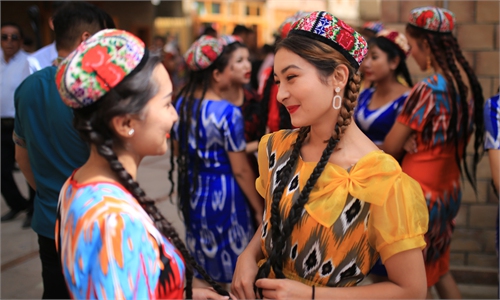Czech president’s opposition to the abuse of the Olympic idea ‘a consensus inside the Europe’

Czech President Milos Zeman. File photo:Xinhua
Czech President Milos Zeman said on Saturday that he opposes to the abuse of the Olympic idea for political purposes, and it won't have any impact if some "political bigwigs" are not present at the upcoming Beijing 2022 Olympic and Paralympic Winter Games.
Chinese analysts said such a positive stance on the Winter Games vis-a-vis those of some Czech officials indicated that there's a growing consensus inside the Europe in rejecting the so-called political boycott.
"I am fundamentally opposed to the abuse of the Olympic idea for political purposes," Zeman said in a message published by his office on the occasion of the nomination of the Czech Olympic team for the upcoming Winter Olympics, the Xinhua News Agency reported on Saturday.
"Frankly, if some political bigwigs aren't at the Olympics, nothing terrible will happen," the Czech president said.
The latest stance of Zeman, a relatively friendly European politician toward China, was not surprising in the eyes of some Chinese observers, who said it also represented a growing consensus within the Europe on the Beijing Winter Olympics, as several countries have been sending and will send their athletes to Beijing in spite of some noises in calling for a "boycott" and some European media hype in slandering the Games.
The Czech Olympic Committee on Friday approved a team of 113 athletes for Beijing 2022, a record number of the country for an edition of the Winter Olympics.
Observers noted that such comment, first of all, is in concern of the efforts of Czech athletes, and second, reflects the country's opposition to politicizing the sport events.
Zeman has always been a relatively friendly politician to China, Sun Keqin, a research fellow at the China Institutes of Contemporary International Relations, told the Global Times on Sunday. And inside Europe, the majority of voices oppose to the politicization of the Olympics, even though there were some anti-China manipulation within some major European countries toward the Games, which can't represent their governments' official stances, Sun noted.
Also, Zeman's comment serves as a rebuke to the remarks on Beijing Winter Olympics made days ago by Jan Lipavsky, the new Czech foreign minister.
In an interview for the Beijing Daily in December 26, Czech Ambassador to China Vladimir Tomsik expressed support for the Beijing Winter Games. Tomsik also said he was acting on the request of President Zeman, who has expressed regret at not being able to attend the games in person for health reasons.
However, Lipavsky has called on Tomsik to avoid comments such as the words that he used to support the upcoming Winter Olympic Games, in an interview with local Czech Television on January 10.
Such contradictory attitude between Czech officials shows the division in the Czech government, Cui Hongjian, director of the Department of European Studies at the China Institute of International Studies, told the Global Times on Sunday.
"The differences and grievances between the [Czech] president and the new government are centered on Czech's China policy and the Beijing Winter Olympic Games," Cui said.
Although there was certain hostile sentiment inside Czech, like the case with Lithuania, toward China, both of which were fueled by the anti-China forces, the problem with Czech was mainly caused by the internal conflicts, Sun noted. Also, the health status of Zeman has been worrying in recent years, his opinion has been refrained inside the government, targeted by some anti-China lawmakers, or the "bigwigs" he mentioned like the new foreign minister, he said.
"There are many anti-China politicians in the parliament and other government bodies which makes the pro-China president passive. This leads to contradiction in Czech's overall China policy." Sun said, "But internal anti-China voices are not strong enough to change the overall relationship between China and the Czech Republic."
There were other EU officials who had voiced the support for the Beijing 2022 Games. German Foreign Minister Annalena Baerbock has spoken out against the use of Olympic Games for political purposes on December 13, 2021 to ZDF broadcaster, a German public-service television broadcaster, saying that the Olympic Games are "a celebration of sport," and "shouldn't be used that way."
French President Emmanuel Macron also said at a press conference on December 9, 2021 that France has no plans to join a "diplomatic boycott" of the Beijing 2022 Winter Olympics and any such move would be insignificant and merely symbolic.

